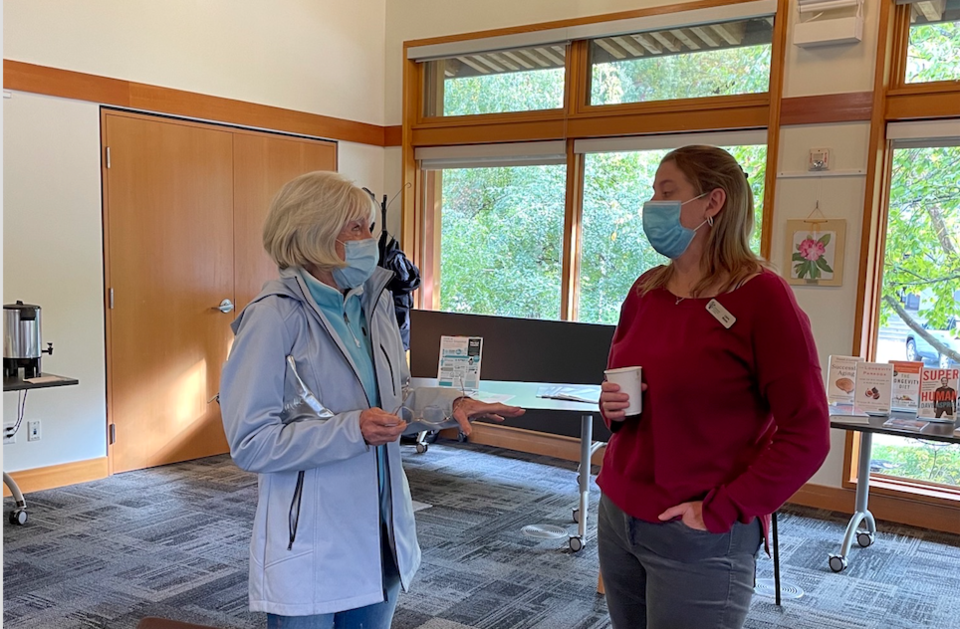The intent behind a recent Whistler Community Foundation (WCF) drop-in open house might have been to release the organization’s new, data-packed COVID-19 Impact Snapshot report, but much of the conversation that day drifted to another topic entirely.
Many of the attendees who stopped by the Whistler Public Library for the Oct. 13 open house were instead eager to continue discussing a question initially brought up during WCF’s most recent Vital Cafe: whether Whistler is currently supportive of an aging population and, in light of the pandemic, whether the resort’s seniors and elders are able to age in place.
The apparent answer, based off the general discussion, currently leans toward “no,” explained WCF executive director Claire Mozes. “I think people think they won’t be able to stay here,” she said. “I think a lot of the seniors are just like, ‘well, we know at some point we’re going to have to leave.’ And so, is there something we can be doing with that?
“I don’t know, but that question came up for sure.”
It’s a question that’s relevant for the wider community in “thinking about what we lose when we lose those people,” added WCF Vital Signs project coordinator Libby McKeever. “We lose a volunteer base, we lose mentorship; wisdom.”
The virtual Vital Cafe held on Sept. 22 addressed the question of aging well in Whistler through the lens of three of the United Nations’ 17 Sustainable Development Goals (SDGs): Good Health and Wellbeing, Reduced Inequalities, and Sustainable Cities and Communities. The WCF’s Vital Signs initiative uses local knowledge and conversation to measure the vitality of Whistler’s community and support action, through the framework of these SDGs.
The event featured a panel of five community members—family physician Dr. Karin Kausky, seniors’ advocate Sue Lawther, Whistler Community Services Society executive director Jackie Dickinson, municipal councillor Cathy Jewett and Mature Action Community board member Peter Dagg—each tasked with answering questions and inspiring discussion under one of those three SDG banners. Following the Q&A, the group of 51 attendees split up to continue the conversation in breakout rooms, where they successfully identified several existing gaps within the Whistler community.
While the possibility for seniors to help fill some of the current job openings in the community emerged as a major positive theme, accessible housing was unsurprisingly one of the biggest concerns repeated during the discussions.
The housing piece links back to data referenced in the WCF’s recently released COVID-19 Impact Snapshot. The report found that Whistler Housing Authority (WHA) rentals are currently sitting at a sub-one per cent vacancy rate, while the average time spent on the WHA purchase waitlist is 5.9 years.
BC Housing equates affordable housing as costing 30 per cent of one’s gross income. Under those parameters, $790 is considered an affordable monthly rate for a minimum wage earner, or $1,590 minimum wage earned per couple. The average advertised monthly rent for a one bedroom rental in Whistler is $2,259 per month, according to the Snapshot report.
(Also of note, the Snapshot found 54 per cent of young adults in Whistler currently spend more than half of their income on housing costs.)
While the Vital Cafe discussions might have centred around seniors’ needs, the conversation was relevant to the broader community, McKeever explained. “We also know that something that’s good for a senior as they age is also good for maybe a family with a disabled child, or somebody who has MS who’s 40, or someone who has mobility issues,” she said.
Other topics broached during the event included the idea of having a dedicated community space offering seniors-specific programming—though “that space would be another community hub where all people could come,” noted McKeever—and the lack of extended care, alternate living options and other health and wellness supports within the resort.
Transportation, or lack thereof, was another recurring issue, added Mozes.
“If the senior gets to a point where they can’t drive themselves, what then?,” she asked. “Is the bus going to work? Maybe in some parts of Whistler, but, does it work for everybody, all the time? Probably not.”
But, she added, “That goes across the board of course, like Libby said, for any number of reasons for people with mobility issues.”




